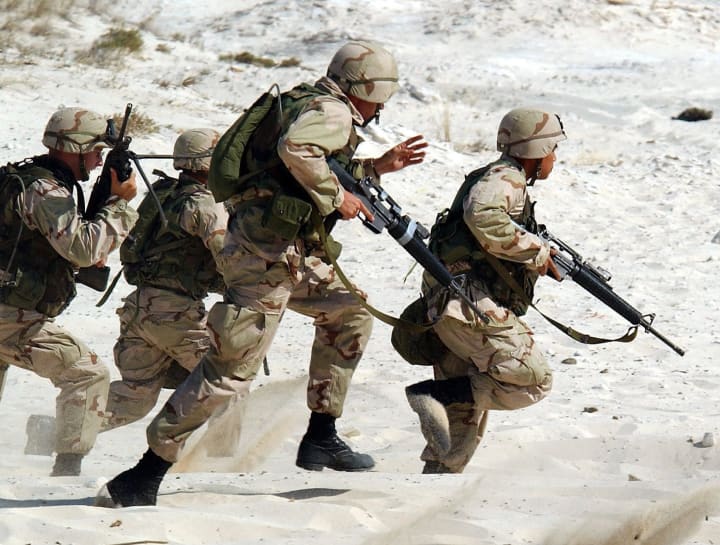10 Signs You Would Do Well in the Military
Here is a comprehensive list of skills and traits that are telltale signs you would do well in the military.

When considering a life of military service, it is important to know if you are prepared to live up to a different standard of fortitude. It takes far more than love of country alone to serve. Other than sheer patriotism, there are inherent signs that one would do well in the military. While physical and mental strength are certainly a given, one must be able to stretch these and other skills to their breaking point. Like a professional athlete, one must possess an unnatural acuity in a number of physical attributes. As such, it is important to define the necessary attributes you should display if you are to show signs you would do well in the military.
You find and improve aspects of your strength that aren't your best.
The physical skills and strengths needed for service in the armed forces are quite comprehensive. When deciding to join the military, one must consider every aspect of their mental and physical fitness. A soldier has to be able to act on the orders of their superiors and operate, at times, in situations of utter chaos and upheaval. Like a skilled football player, an ideal soldier has a combination of bravery, physical speed, agility, mental quickness, and brute strength. Whether you're an Army private or a Navy Seal, you must be ready to use your body in any way for any reason. As such, it is essential to assure that you have the speed, strength, and endurance needed to survive. While it is important to nurture dominant skills and strengths, it is even more critical to become physically well-rounded to minimize any chance of succumbing to one's weaknesses.
You don't just pass fitness tests, you own them.

While it is undeniably important (in fact, required) to pass the entry fitness test before even proceeding with any sort of military training, it is even more critical to hold yourself to the highest possible standard in doing so. While meeting the minimum standards of the military can be a task and accomplishment on its own, it is critical to possess a will and ability to go above and beyond what is assigned. In preparation for the entry test, it is wise to train as if the test were far more rigorous and stringent. One should strive to push beyond their limits, as this will be crucial and thematic throughout their journey, definitely something to consider when training for tactical fitness goals. By overshooting these marks, one can assure that they will not come up short in their pursuit. The results of one's entry test are also a good metric of how you will fair going forward in training and beyond. Such commitment is likely to result in greater readiness, strength, and stamina.
You have great endurance.
As previously mentioned, endurance is one of the most essential attributes for success in the armed forces. As combat is often waged in remote and/or rough terrains, movement over long distances, obstacles, and periods of time are to be expected when training and fighting. To succeed in combat, a soldier must be able to remain physically active for, often, indefinite periods of time. Such conflicts of attrition are greatly reflected in training. Though training has some variances between the different branches, there are certain core skills and requirements across the board. Regardless of what branch of military training you choose, one thing is for certain; you will spend a great deal of time running. As such, it is critical to assure that one can run great distances and for long periods of time. In this and other respects, one must dedicate absurd amounts of time to their physical conditioning, treating the pursuit like a full time job (with overtime).
You can run well with tons of heavy gear weighing you down.

As soldiers often have to carry large amounts of gear in the field, it is crucial to know how well you can still physically operate under such conditions. Consequently, it is not enough to simply know that you can run far, fast, and for a long time. A soldier of any sort will need to be able to train to these super-athletic standards while weighed down by massive amounts of equipment. In terms of readiness, this is a crucial means to assess certain aspects of one's bodily fitness. An individual with severe back problems will most likely do poorly in supporting such weight, as they will need a strong foundation to carry such loads. As such, it is important to assure the strength and solidity of one's core. It is advisable to train oneself with weighted vests, so as to approximate such conditions as one would face in training and the field.
You can burn the candle at both ends.
As in life, sleep is an important tool of success in the military. However, in joining the military, one should prepare for the likely reality there may be times when they must go without it indefinitely. The recruit must adapt to a state of near sleep-deprivation while still continuing to exercise with manic enthusiasm. While this may seem counter-intuitive in terms of recovery and mental sharpness, one must realize that is, itself, the point of such efforts. While recovery is important in fitness and health, training in the military is meant to prepare a soldier for any number of conditions. As such, it is critical that one is able to commit great amounts of time and energy to training while remaining mentally alert. Soldiers must be able to push themselves to the extremes of their fortitude to assure that they will be able to act under great adversity and danger.
Your body can handle a lot of running.

While increasing running speed, stamina and weight carriage will make or break you in the military. It is important to remember that you are still human, and, therefore, limited in some respects. Though this seems contrary to the spirit of the training, one must assure that their over ambition does not translate to injuries. While it is still important to work out with far greater frequency and intensity, it will do you no good to work yourself to the point of injury. Likewise, certain conditions, such as shin splints, are likely to hamper one's ability to run effectively and without pain. Accordingly, it is indispensable to assure that your body is up to the task as you proceed. If all goes well, you will hopefully see a reduction in muscle fatigue and soreness as you advance. If not, you may wish to reconsider taking on such a career, as such pains will not serve you well in action.
You spread out and mix up your workouts.
You can't just set up a time once a day to do one type of workout. It is critical to get used to being physically active throughout the day. This requires a willingness to dedicate any extra time to the cause. With that in mind, one should set out to do different workouts at different times of the day. One should not treat work and exercise as a sort of A, B composition where they do one and then the other. It is important that you recognize the ultimate importance of the training over that which you are doing currently. As such, your training should weave in and out of the rest of your day so that it becomes more of a norm to you, ingraining itself far deeper into your work ethic. As there are a number of challenging aspects to becoming a military personnel, one should try a variety of workouts; such as running, swimming, and weight lifting, choosing to begin the day with one activity, punctuate the afternoon with another, and finish off one's day with yet another.
You do your homework.

Though this seems like a no-brainer, know precisely what you will be asked to do in your training. Studying all the geometry in the world won't help you ace your chemistry test. If you skip the instructions while taking that test, you are almost certain to fail. If you don't know what to expect, you can at least expect that you are in for a rude awakening. Don't pour countless hours into your workout unless you know that you are working towards the right benchmarks and skills. This is where the distinct differences in training between the Army, Marine Corps, Navy, Air Force, and National Guard will be important to note. Among these programs, there are variances in focus on different physical aspects, as well as levels of difficulty. One clearly should not expect the same level of difficulty in training for the Army as, say, training for the Navy Seals, or even how to survive Marines Corps basic training. It is important to know that you have prepared yourself to the standards of the branch of service you wish to enter.
You can swim very well.
Just as it can be a beneficial part of your preparation workout, swimming is an important skill requirement in most military training. With a litany of potential life or death scenarios, the importance of competence in swimming is critical. This is especially important in the seafaring Naval and Marine Corps branches, though it is a required and important survival skill across the board. In most cases, one will need to be able to tread water for long periods of time, as well as swim substantial distances with flippers, though this is just sampling of the tasks presented. It is important that you are perfectly comfortable around and in the water, and maintain good form while in it. One should also be able to, and practice, holding their breath under stress, as this can come into play with some programs. These are the basics, though some training requires proficiency in Scuba diving, swimming in the dark, and other limit-pushing tasks, so it's important to know what to expect.
You bounce back well.

When taking on such a daunting physical task, one must not only consider how effectively they can pursue their goals, but how quickly they can recover to repeat the process. For many people, and indeed early on in your work-out regimen, it is easy to feel physically banged up and fatigued after intense workouts. For many, this can be not only discouraging, but can also diminish their progress. This is where it is important to find the perfect balances of sleep, proper diet, and exercises. Without putting all of these in reasonable balance with one another, it is far more difficult to recover from heavy workouts and, consequently, increasingly hard to sustain them. One needs to be able to wake up and operate with the dependability and power of a diesel engine. If you don't properly recover between workouts, your momentum may begin to wain like a slowing pendulum. If you never fully recover, you will likely see diminishing returns on your progress and stamina.
About the Creator
Fred Eugene Park
Fred Park is a writer, singer and guitarist with a deep passion for music, sports and history. Fred graduated from Purchase College in 2016 with a BA in history.






Comments
There are no comments for this story
Be the first to respond and start the conversation.